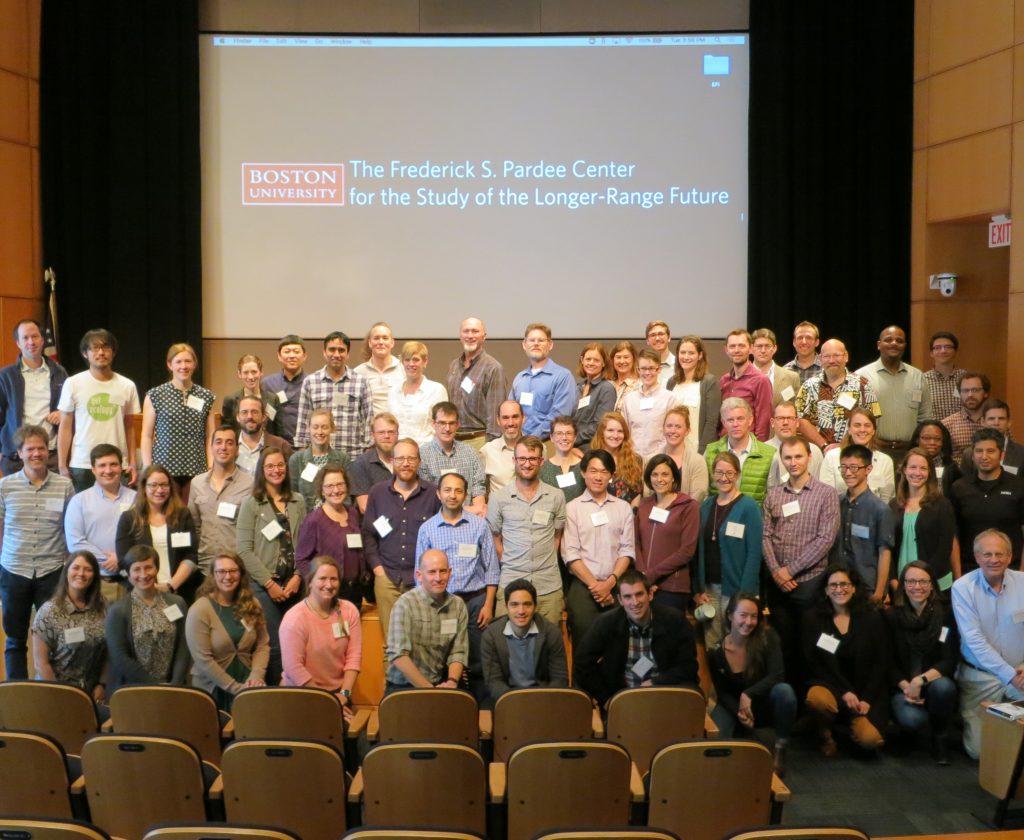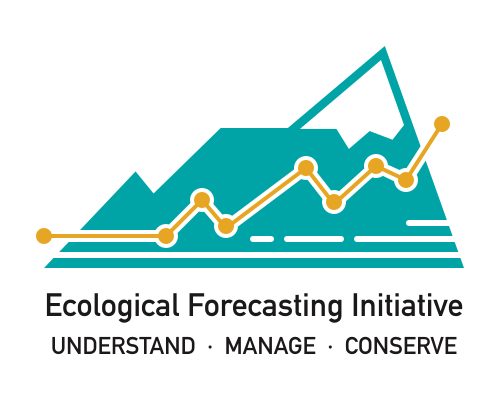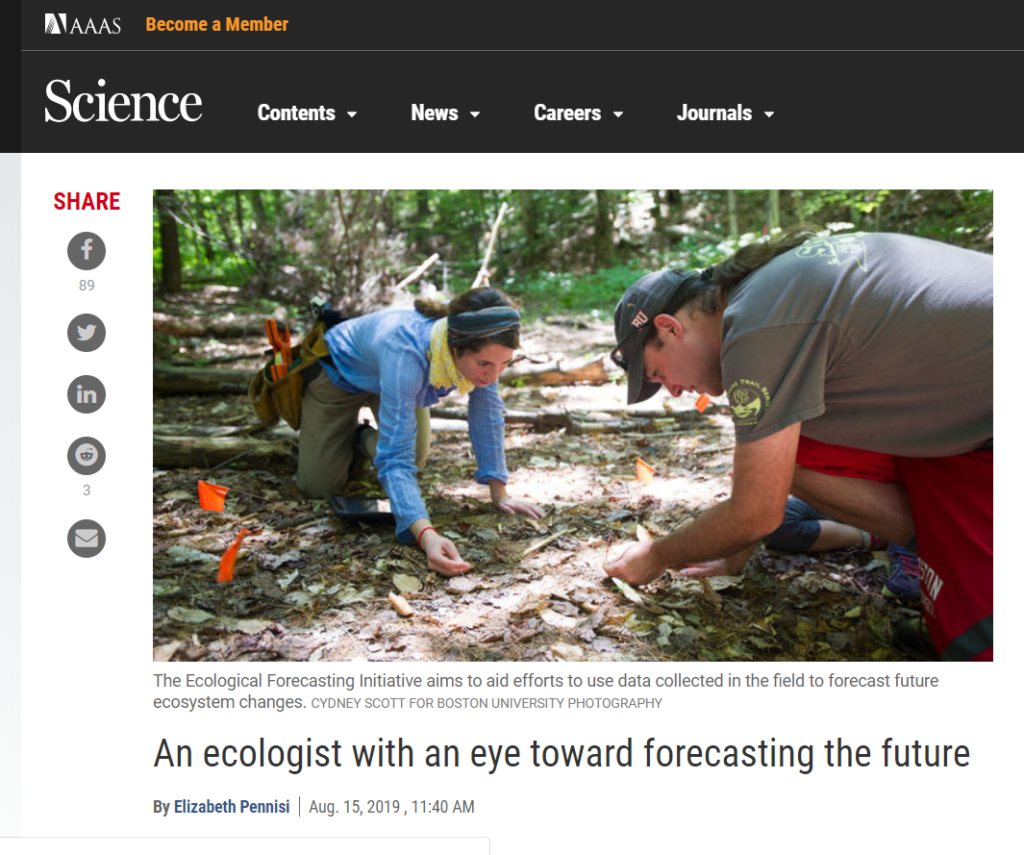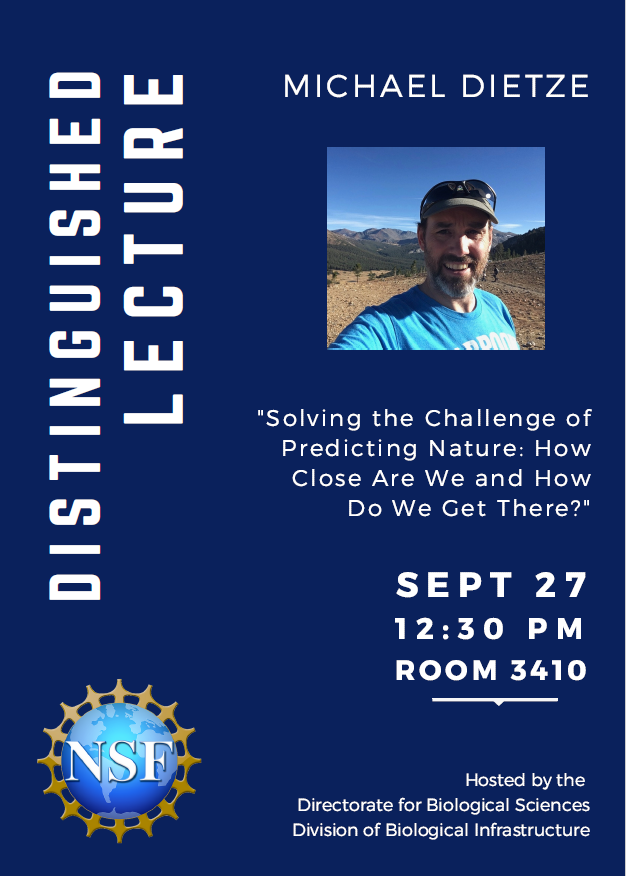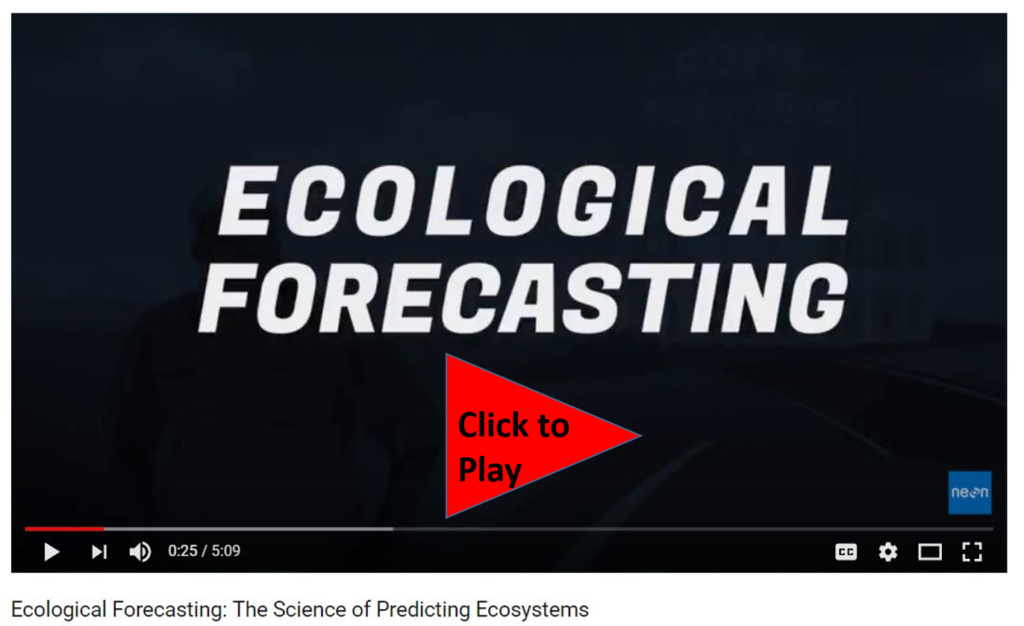Date: December 6, 2019
EFI’s oral and poster sessions on “Ecological Forecasting in the Earth System” have been scheduled for Wednesday, December 11, 2019 from 4-6pm in Moscone 3001 (oral session) and on Wednesday morning from 8am-12:20pm(posters). We’re excited to have a great set of speakers that really span the full gradient from terrestrial to freshwater to marine. Come check out the following talks!
Wednesday EFI Oral Session (4-6pm, Moscone 3001)
16:00 Nicole Lovenduski – High predictability of terrestrial carbon fluxes from an initialized decadal prediction system
16:15 Ben Bond-Lamberty – Linking field, model, and remote sensing methods to understand when tree mortality breaks the forest carbon cycle
16:30 Zoey Werbin – Forecasting the Soil Microbiome
16:45 Brian Enquist – Forecasting future global biodiversity: Predicting current and future global plant distributions, community structure, and ecosystem function
17:00 Heather Welch – Managing the ocean in real-time: Ecological forecasts for dynamic management
17:15 Clarissa Anderson – Bringing new life to harmful algal bloom prediction after crossing the valley of death
17:30 Ryan McClure – Successful real-time prediction of methane ebullition rates in a eutrophic reservoir using temperature via iterative near-term forecasts
17:45 Carl Boettiger – Theoretical Limits to Forecasting in Ecological Systems (And What to Do About It)
Wednesday EFI Poster Session (8am-12:20pm, Moscone South Poster Hall)
Christopher Trisos – B31J-2509 The Projected Timing of Abrupt Ecological Disruption from Climate Change
Gleyce K. D. Araujo Figueiredo – B31J-2510 Spatial and temporal relationship between aboveground biomass and the enhanced vegetation index for a mixed pasture in a Brazilian integrated crop livestock system
Rafael Vasconcelos Valadares B31J-2511 Modeling Brazilian Integrated Crop-Livestock Systems
Zhao Qian – B31J-2512 An optimal projection of the changes in global leaf area index in the 21st century
Takeshi Ise – B31J-2513 Causal relationships in mesoscale teleconnections between land and sea: a study with satellite data
Hisashi Sato – B31J-2514 Reconstructing and predicting global potential natural vegetation with a deep neural network model
Masanori Onishi – B31J-2515 The combination of UAVs and deep neural networks has a potential as a new framework of vegetation monitoring
Yurika Oba – B31J-2516 VARENN: Graphical representation of spatiotemporal data and application to climate studies
Stephan Pietsch – B31J-2517 A Fast and Easy to use Method to Forecast the Risks of Loss of Ecosystem Stability: The Epsilon Section of Correlation Sums
Jake F Weltzin – B31J-2518 Developing capacity for applied ecological forecasting across the federal research and natural resource management community
Theresa M Crimmins – B31J-2519 What have we learned from two seasons of forecasting phenology? The USA National Phenology Network’s experience operationalizing Pheno Forecasts
Tim Sheehan – B31J-2520 Sharp Turn Ahead: Modeling the Risk of Sudden Forest Change in the Western Conterminous United States
Margaret Evans – B31J-2521 Continental-scale Projection of Future Douglas-fir Growth from Tree Rings: Testing the Limits of Space-for-Time Substitution
Ann Raiho – B31J-2522 Improving forecasting of biome shifts with data assimilation of paleoecological data
Quinn Thomas – B31J-2523 Near-term iterative forecasting of water quality in a reservoir reveals relative forecastability of physical, chemical, and biological dynamics
Alexey N Shiklomanov – B31J-2524 Structural and parameter uncertainty in centennial-scale simulations of community succession in Upper Midwest temperate forests
Peter Kalmus – B31J-2525 Identifying coral refugia from observationally weighted climate model ensembles
Jessica L O’Connell – B31J-2526 Spatiotemporal variation in site-wide Spartina alterniflora belowground biomass may provide an early warning of tidal marsh vulnerability to sea level rise
Rafael J. P. Schmitt – B31J-2527 Assessing existing and future dam impacts on the connectivity of freshwater fish ranges worldwide
Teng Keng Vang – B31J-2528 Site characteristics of beaver dams in southwest Ohio
Other Forecasting Presentations
Mon 13:40-15:40, Moscone South e-Lightning Theater: Alexandria Hounshell, ED13B-07 Macrosystems EDDIE: Using hands-on teaching modules to build computational literacy and water resources concepts in undergraduate curricula (Alex’s presentation will be at ~2pm)
Mon 13:40-18:00, Poster Hall: Hamze Dokoohaki B13F-2442 – A model–data fusion approach to estimating terrestrial carbon budgets across the contiguous U.S
Mon 14:25, Moscone 3005: Michael Dietze B13A-04 – Near real-time forecasting of terrestrial carbon and water pools and fluxes
Mon 17:40, Moscone 3003: Michael Dietze B14B-11 Near real-time forecasting in the biogeosciences: toward a more predictive and societally-relevant science
Tues 13:40-18:00, Poster Hall: Erin Conlisk B23F-2598 – Forecasting Wetland Habitat to Support Multi-Species Management Decisions in the Central Valley of California
Wed 08:00-12:20, Poster Hall: B31H Building Resilient Agricultural Systems Supported by Near-Term Climate and Yield Forecasts II [Poster Session]
Wed 13:55, Moscone 3005: Inez Fung B33A-02 – Towards verifying national CO2 emissions
Thurs 09:15, Moscone 3012: John Reager B41A-06 – Hydrological predictors of fire danger: using satellite observations for monthly to seasonal forecasting
Fri 10:20-12:20, Moscone 3007: B52A Building Resilient Agricultural Systems Supported by Near-Term Climate and Yield Forecasts I [Oral Session]
EFI Social
Anyone who is available to meet up after the Forecasting Session on Wednesday, we’ll have a group getting together at Tempest starting around 6:30 pm. It’s an 8 minute walk. Find directions here.
Seeking Judges for Outstanding Student Presentations
We would like to recruit judges for the student presentations in our forecasting sessions at AGU this year. We have one candidate for Outstanding Student Presentation in our poster session on Wednesday morning (B31J) and two candidates in our oral session Wednesday afternoon (B34C). If you plan to attend either of these sessions, please consider helping to mentor a young researcher with some constructive feedback.
You can sign up to judge at https://ospa.agu.org/2019/ospa/judges/ to register and agree to the honor code by selecting “Register to Judge”.Once there, sign up for the student presentations you wish to evaluate. Every judge must sign up for at least three presentations to ensure that all students are provided with feedback. Select “Find Presentations”. You can search for presentations by B31J or B34C in the lower of the two “quick search” boxes.When you arrive for Fall Meeting, confirm the time and location of the presentations you are evaluating. You can sync your judging schedule to your personal calendar to ensure you don’t accidentally miss any presentations. Go to your OSPA schedule and click ‘Add to Calendar’ on the task bar. Your judging schedule will now be added to your Google Calendar, Outlook, or iCalendar.You will need to evaluate all presentations you volunteered to judge. Students depend on your feedback to assess their presentation skills, identify the areas in which they are performing well, and areas that need improvement.Either submit scores in real time on a tablet or mobile device or take notes while you evaluate students and enter the scores later. Do not rely on your memory alone to submit complete scores at a later time. Students participate in OSPA to improve their presentation skills, so please provide them with thorough feedback. This year, comments are required in addition to the numerical scores. All reviews must be entered into the OSPA site no later than Friday, 20 December 2019, at 11:59 p.m. EDT.Finally, be constructive! OSPA presenters range in education levels from undergraduate to Ph.D. students. There are also many presenters for whom English is not their first language. Keep these things in mind when providing feedback. Judges are asked to evaluate students at their current education and language proficiency levels.

